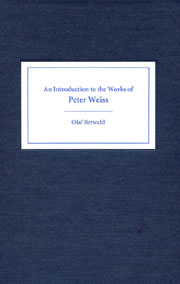Book contents
- Frontmatter
- Contents
- Acknowledgments
- Introduction
- 1 Subversive Slapstick: The Early Plays Der Turm, Die Versicherung, Nacht mit Gästen, and Mockinpott
- 2 The Choreography of Documents: Die Ermittlung, Gesang vom Lusitanischen Popanz, and Viet Nam Diskurs
- 3 Staging Writers as Outcasts: Marat/Sade, Trotzki im Exil, Hölderlin, Der Prozess, and Der neue Prozess
- 4 Scenarios of Stagnation: Early Prose
- 5 Autobiography and Fiction: Abschied von den Eltern, Fluchtpunkt, and Rekonvaleszenz
- 6 Poetics and Politics: Essays, Open Letters, and Fragments
- 7 Perception as Resistance: Die Ästhetik des Widerstands
- Works Consulted
- Index
4 - Scenarios of Stagnation: Early Prose
Published online by Cambridge University Press: 05 February 2013
- Frontmatter
- Contents
- Acknowledgments
- Introduction
- 1 Subversive Slapstick: The Early Plays Der Turm, Die Versicherung, Nacht mit Gästen, and Mockinpott
- 2 The Choreography of Documents: Die Ermittlung, Gesang vom Lusitanischen Popanz, and Viet Nam Diskurs
- 3 Staging Writers as Outcasts: Marat/Sade, Trotzki im Exil, Hölderlin, Der Prozess, and Der neue Prozess
- 4 Scenarios of Stagnation: Early Prose
- 5 Autobiography and Fiction: Abschied von den Eltern, Fluchtpunkt, and Rekonvaleszenz
- 6 Poetics and Politics: Essays, Open Letters, and Fragments
- 7 Perception as Resistance: Die Ästhetik des Widerstands
- Works Consulted
- Index
Summary
Weiss's early prose is worth studying as a transitory but necessary experimental phase of his writing. Without the excessive explorations of narrative deadlocks and exercises in disturbing repetitiveness that marks his early prose, Weiss, who conceded the slow maturation process of his art, would probably not have been able to produce his more complex and inexhaustibly rich later works. The fact that much of his early prose was rejected by publishers and only became accessible after Weiss had become famous might indicate the unfinished character of the early prose texts that often read like self-absorbed psychoanalytic vignettes and dream journals. However, the apparent shortcomings of most of Weiss's early prose can also be read as conscious failures and attacks on conventional aesthetic techniques. A microscopic view replaces any desire for recognizable coherence. His aesthetic experiments and his obsession with gloomy introspective scenarios, inherited from Kafka and the French writers Camus, Sartre, and Robbe-Grillet, will remain an important undercurrent of Weiss's later work. In rudimentary form, one could even argue that already in his early prose, Weiss tries to blend blurry journeys into the unconscious with observations of the social world and its forms of violence. Hardly any twentieth-century writer refuses to seek refuge in easy closure to the extent that Weiss does. It is hard simply to enjoy Weiss's works in one reading because his writings for the most part lack any offer of reconciliatory relief.
- Type
- Chapter
- Information
- An Introduction to the Works of Peter Weiss , pp. 69 - 81Publisher: Boydell & BrewerPrint publication year: 2003



